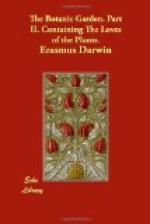[Cistus labdaniferus. l. 304. Many males, one female. The petals of this beautiful and fragrant shrub, as well as of the Oenothera, tree primrose, and others, continue expanded but a few hours, falling off about noon, or soon after, in hot weather. The most beautiful flowers of the Cactus grandiflorus (see Cerea) are of equally short duration, but have their existence in the night. And the flowers of the Hibiscus trionum are said to continue but a single hour. The courtship between the males and females in these flowers might be easily watched; the males are said to approach and recede from the females alternately. The flowers of the Hibiscus sinensis, mutable rose, live in the West Indies, their native climate, but one day; but have this remarkable property, they are white at the first expansion, then change to deep red, and become purple as they decay.
The gum or resin of this fragrant vegetable is collected from extensive underwoods of it in the East by a singular contrivance. Long leathern thongs are tied to poles and cords, and drawn over the tops of these shrubs about noon; which thus collect the dust of the anthers, which adheres to the leather, and is occasionally scraped off. Thus in some degree is the manner imitated, in which the bee collects on his thighs and legs the same material for the construction of his combs.]
I.
“Born
in yon blaze of orient sky,
310 “Sweet MAY! thy radiant form unfold;
“Unclose
thy blue voluptuous eye,
“And
wave thy shadowy locks of gold.
II.
“For
Thee the fragrant zephyrs blow,
“For
Thee descends the sunny shower;
315 “The rills in softer murmurs slow,
“And
brighter blossoms gem the bower.
III.
“Light
Graces dress’d in flowery wreaths
“And
tiptoe Joys their hands combine;
“And
Love his sweet contagion breathes,
320 “And laughing dances round thy shrine.
IV.
“Warm
with new life the glittering throngs
“On
quivering fin and rustling wing
“Delighted
join their votive songs,
“And
hail thee, GODDESS OF THE SPRING.”
325 O’er the green brinks of Severn’s
oozy bed,
In
changeful rings, her sprightly troop She led;
PAN
tripp’d before, where Eudness shades the mead,
And
blew with glowing lip his sevenfold reed;
Emerging
Naiads swell’d the jocund strain,
330 And aped with mimic step the dancing train.—
[Sevenfold reed. I. 328. The sevenfold reed, with which Pan is frequently described, seems to indicate, that he was the inventor of the musical gamut.]
“I
faint, I fall!”—at noon the
Beauty cried,
“Weep
o’er my tomb, ye Nymphs!”—and
sunk and died.
—Thus,
when white Winter o’er the shivering clime




